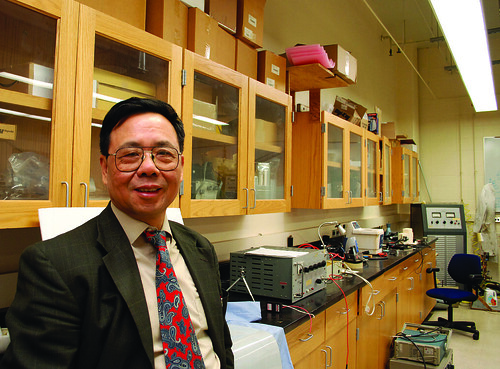Presidential candidates have suggested inflating your tires, mechanics instruct motorists to keep their cars in shape and everyday drivers are cutting their travels when possible. But the physics department at Temple has developed a part for vehicles that may impact drivers’ wallets.
Rongjia Tao, chair of the physics department, has developed a small device that when connected to the fuel line in diesel engines can improve gas efficiency by 20 percent.

The device receives power from a vehicle’s battery to create an electric field that thins fuel, resulting in smaller amounts of fuel being injected into the engine.
Development of the device began in 2006 with Tao and five other researchers, two of whom were Temple students.
“The major difficulty was that there was a shortage of good technicians in our machine shop to manufacture the device,” Tao said.
After testing the device on a Mercedes-Benz 300D, there was an increase in highway miles per gallon from 32 to 38. City driving tests resulted in a 15 percent gain.
The group intended to improve fuel efficiency and decrease pollutant emissions according to the study published in Energy & Fuels.
Diesel-powered vehicles gain more mpg, along with less black plumes of exhaust. The use of biodiesel, an alternative diesel fuel made from renewable resources, has lower emissions compared to petroleum diesel.
The device was selected by Save The World Air, Inc. According to its Web site, STWA seeks “to provide a comprehensive range of cost-effective and value-added products to the worldwide combustion engine market” that are deemed clean technology resources.
STWA became aware of Tao’s product through a client who provided research grants. The corporation purchased licenses to Tao’s patents. STWA has a contract with AWI Truck Company of Reading, Pa., to install the device on its trucks.
Eddie Casanova, an employee of Temple’s grounds department, drives a diesel truck for the university. Temple pays for the fuel in the truck Casanova drives.
“We should have gotten the first choice,” Casanova said about the device being used in Reading rather than being implemented on campus first.
Expanding the research to gasoline engines is under way, as testing is scheduled to be performed soon, Tao said.
“I feel that basic science research can be very useful in solving some big technology issues.”
Greg Adomaitis can be reached at greg.adomaitis@temple.edu.


Be the first to comment